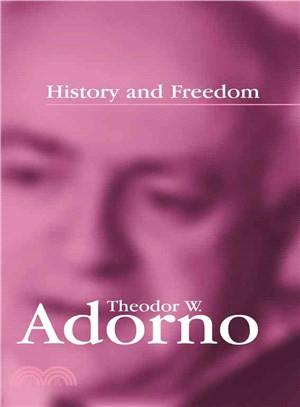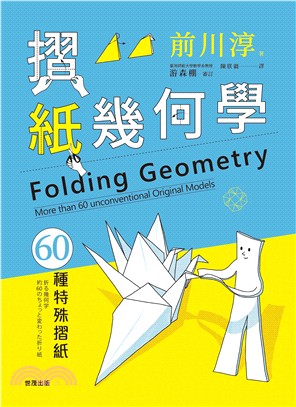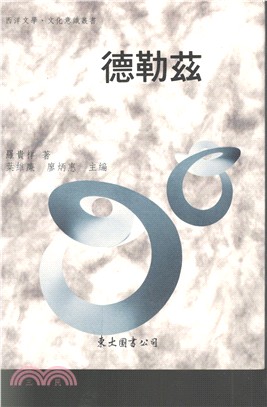History And Freedom - Lectures 1964-1965
- ISBN13:9780745630137
- 出版社:John Wiley & Sons Inc
- 作者:Adorno
- 裝訂/頁數:平裝/368頁
- 出版日:2006/10/07
商品簡介
Early in the 1960s Adorno gave four courses of lectures on the road leading to Negative Dialectics, his magnum opus of 1966. The second of these was concerned with the topics of history and freedom. In terms of content, these lectures represented an early version of the chapters in Negative Dialectics devoted to Kant and Hegel. In formal terms, these were improvised lectures that permit us to glimpse a philosophical work in progress.
The text published here gives us an overview of all the themes and motifs of Adorno's philosophy of history: the key notion of the domination of nature, his criticism of the existentialist concept of a historicity without history and, finally, his opposition to the traditional idea of truth as something permanent, unchanging and ahistorical.
作者簡介
Translated by R.Livingstone
目次
Editor's Foreword
History
LECTURE ONE: Progress or Regression?
Notes: the relationship of the lectures to Negative Dialectics; the concept of freedom in Kant and Hegel; the diminshing consciousness of freedom; the meaning of history refuted by Auschwitz; the philosophy of history implies that there is a meaning; cultural morphology (Spengler) and idealism
LECTURE TWO: Universal and Particular
Trend and individual fact ? Distance from and closeness to detail; progress as a particular ? Rationality as a universal; rationality as the mastering of nature ? The concept of universal history; rationality as a form of conflict; `Faustian technology' and modes of production ? Hegel's concept of spirit [Geist]; spirit and technical rationality; spirit not primary, but a product ? The immediate experience of the universal and the universal itself denounced as metaphysics; negativity as a universal
LECTURE THREE: Constitution Problems
The truth of facts ? Immediacy and mediation; individuality and the `untrue' universal ? Simmel's philosophy of history; the problem of constitution (I) ? The problem of constitution (II) ? De Maistre; the grounds of knowledge and grounds of reality ? Hegel's `world spirit' and the spirit of the age ? The logic of things and heteronomy
LECTURE FOUR: The Concept of Mediation
Facts as a cloak ? The experience of the speculative; experience of committees ? Formal sociology; group opinion and social totality ? French Revolution (I) ? French Revolution (II); underlying cause and proximate cause : course of history and individual moment ? French Revolution (III); primacy of the course of history: `economy based on expenditure' instead of `economy based on acquisition' ; the theory of historical categories
LECTURE FIVE: The Totality on the Road to Self-Realization
Philosophy of history and historiography ? Parti pris for the universal ? Hegel's class standpoint ? In defence of Hegel ? Reason as unreason; individual interest and species; humanity: `public company for the exploitation of nature' ? Conflict in the concept of reason ? The odious totality
LECTURE SIX: Conflict and Survival
Ambivalence of totality; Marx's optimistic view of history ? Conflict and totality ? Theodicy of conflict ? Conflict and the reproduction of life ? Conflict and prehistory; the economy or relations of domination ? Contemplative and revolutionary conceptions of history; the problem of anarchism ? Defence of non-conformism
LECTURE SEVEN: Spirit and the Course of the World
The concept of conformism ? Critique of the hypostasization of concepts; the concept of reason; the irrationality of reason ? Law and `emotional warmth' in Hegel; universality in the particular ? The course of the world and individual conscience; µefe??? of the spirit ?- Theodicy of rupture and concrete possibility
LECTURE EIGHT: Psychology
The concept of the charackter mask ? Individuation and socialization ? Identity and the semblance of reconciliation ? `Sowing one's wild oats' ? Intellectual forms of self-preservation and human breakdown; identification with the aggressor ? Acquiescing in self-destruction; concretism; psychology as cement
LECTURE NINE: The Critique of Universal History
The course of the argument ? The concept of universal history (I) ? The concept of universal history (II) ? False mastery and vindication of induction; Hegel's theory of history ? Freedom and the individual in Hegel ? The individuality in antiquity and the early modern age ? History from the standpoint of the victor
LECTURE TEN: `Negative' Universal History
Benjamin's XVIIth thesis ? Temporal core and non-identity ? Continuity and discontinuity ? History as a gigantic exchange relationship ? The total state and the rule of competing cliques ? Dialectic of the particular ? The concept of chance; the utopia of knowledge ? Hegel's critique of the totality; course of the argument
LECTURE ELEVEN: The Nation and the Spirit of the People in Hegel
Notes: Spirit of the people and universal spirit; universal history as universal tribunal; pseudo-concreteness; repressive archaisms; anti-Cartesian elements in Vico, Montesquieu, Herder and Hegel; cult of the nation
LECTURE TWELVE: The Principle of Nationality
The nation: a bourgeois form of organization, departure from natural forms of association ? The path to delusions of race ? Progressive aspects of the nation ? The principle of nationality and natural history ?The equality of the organization of life today ? Hegel's theory of national spirit obsolete; decentralization through technology ? Germany `the belated nation' ? Predominance of the universal over the individual; objective reason split off from subjective reason ? `Infernal machine'; natural history in Hegel
LECTURE THIRTEEN: The History of Nature (I)
Notes: Nature and history; history as spirit; the history of nature as a critical concept; Marx, the ironical Social Darwinist; mythical nature of history; first and second nature
LECTURE FOURTEEN: The History of Nature (II)
The concept of second nature ? Nature and history mediated ? Critique of `historicity'; meaning and chance ? Philosophy as interpretation (I); transience and allegory; philosophy's transition to the concrete; history as secularized metaphysics ? Philosophy as interpretation (II); hermeneutics ? Practice thwarted; critique of the metaphysics of time
Progress
LECTURE FIFTEEN: On Interpretation: the Concept of Progress (I)
The history of nature, allegory, criticism ? Secularized melancholy; theory of interpretation; Hölderlin's `Der Winkel von Hardt' ? Immediacy as the product of history; Hegel and Marx; art ? The pleasures of interpretation ? The concept of progress as a link between philosophy of history and the theory of freedom ? Critique of nominalism ? `Whether progress exists'
LECTURE SIXTEEN: On Interpretation: the Concept of Progress (II)
Towards conceptual synthesis ? Progress as a way of averting catastrophe; the global social subject ? Kant's idea of humanity ? Benjamin's critique of progress ? Progress and redemption in St. Augustine ? Escaping the trammels of the past ? Progress mediated by society ? Reconciliation and conflict in Kant; progress as absolutely mythical and anti-mythical
LECTURE SEVENTEEN: On Interpretation: the Concept of Progress (III)
Art nouveau, Ibsen ? Decadence and utopia; bourgeois coldness and privileged happiness; dialectics of individuation ? Decadence and the defamation of sex; art nouveau and expresssionism ? The domination of nature and the flowering of reason; Kant and Hegel's concepts of reason; myth and de-mythologization in one ? The idea of progress in the eighteenth and nineteenth centuries ? Two concepts of progress ? The dialectics of inwardness; critique of the decisionism of existentialist spontaneity ? Spirit as the repository of progress
LECTURE EIGHTEEN: On Interpretation: the Concept of Progress (IV)
Static elements of the spirit ? Progress and mastery of material ? Philosophical progress ? Programme of reflection on the nature of philosophy ? The concept of exchange; exchange and myth ? Correcting progress ? Pro domo
Freedom
The concepts of freedom and the spell; concentration on free will; freedom as the epitome of resistance to the spell
LECTURE NINETEEN: Transition to Moral Philosophy
Non-existence of freedom in history ? Individual freedom, social unfreedom ? Freedom as a historical concept ? The possibility of freedom in unfreedom ? The current state of the forces of production ? Reason and freedom ? Model and constellation; free will and interiority
LECTURE TWENTY: What is Free Will?
Notes: Inside and outside reciprocally mediated; will and freedom not to be hypostasized; on pseudo-problems [Scheinproblem]; will and freedom synthesize individual impulses
LECTURE TWENTY-ONE: Freedom and Bourgeois Society
Towards a definition of will: the substratum of freedom ? Will as the ordered unity of spontaneous and rational impulses; will and a strong ego; non-ego as model of the ego ? Freedom and emancipation of the bourgeoisie; freedom and psychology ? The scientific impulse versus de-mystification; bourgeois ambivalence ? Theory of freedom as Sunday sermon ? Freedom in the service of oppression; the psychoanalysis of the super-ego
LECTURE TWENTY-TWO: Freedom in Unfreedom
Freedom as problem and cliché ? Auschwitz as absolute negation of freedom ? Guilt ? Freedom and excessive demands ? `Evil' as unfreedom ? The ageing of moral categories; society and the individual
LECTURE TWENTY-THREE: Antinomies of Freedom
The narcissistic interest in freedom ? Conformity as the dark side of freedom ? Impulse, mimesis, irrationality ? Kant's concept of spontaneity ? Spontaneity as something transcendental ? The dialectics of spontaneity; Marx, Rosa Luxemburg Obsessional neurosis; the ego-alien ego
LECTURE TWENTY-FOUR: Rationality and the Additional Factor
Freud's theory of repression; blindness of the ego ? Ideology of inwardness ? The `sphere of absolute origins' and the subject ? Critique of the experimenta crucis ? Kant's `gallows in front of the house' ? Kant's cardsharp ? Apriorism or the empirical as determining factor; the construction of the intelligible character
LECTURE TWENTY-FIVE: Consciousness and Impulse
Consciousness versus causality ? Without consciousness, no will ? Hamlet (I) ? The medieval ordo: critique of Romanticism; Hamlet (II) ? Hamlet (III); the additional or the irrational factor ? The archaic element of the will ? The archaic transformed ? Reason and impulse
LECTURE TWENTY-SIX: Kant's Theory of Free Will
Evidence of impulse ? The problem of theory and practice in Kant; lectures as a genre ? Kant's historicization of reflections on the moral law ? Freedom as the determinate negation of unfreedom; Kant's doctrine of freedom as fiction ? Freedom a paradox in Kant; natura naturans and natura naturata ? Kant's `borrowed' ideas of goodness; mediation repressive in Kant ? Freedom as consciousness of the law
LECTURE TWENTY-SEVEN: Will and Reason
The dual character of Kant's concept of reason ? The ontologizing of the will in Kant ? Kant's false definition of will ? Defence of formalism, misuse of the concrete; Scheler ? The concept of character ? Character and the `dissolute' [Aufgelöste] ? Will and reason
LECTURE TWENTY-EIGHT: Moral Uncertainties
Ontological validity and ontic genesis mediated ? Voluntarist and intellectual elements ? Morality as self-evident; good and evil ? Will and violence; no moral certainty ? Solidarity and heteronomy in matters of conscience ? Universal and individual in moral philosophy ? Free and unfree ? Lectures on `Metaphysics'
Notes
References
Index of Names
Index of Subjects
主題書展
更多主題書展
更多書展本週66折
您曾經瀏覽過的商品
購物須知
外文書商品之書封,為出版社提供之樣本。實際出貨商品,以出版社所提供之現有版本為主。部份書籍,因出版社供應狀況特殊,匯率將依實際狀況做調整。
無庫存之商品,在您完成訂單程序之後,將以空運的方式為你下單調貨。為了縮短等待的時間,建議您將外文書與其他商品分開下單,以獲得最快的取貨速度,平均調貨時間為1~2個月。
為了保護您的權益,「三民網路書店」提供會員七日商品鑑賞期(收到商品為起始日)。
若要辦理退貨,請在商品鑑賞期內寄回,且商品必須是全新狀態與完整包裝(商品、附件、發票、隨貨贈品等)否則恕不接受退貨。
























